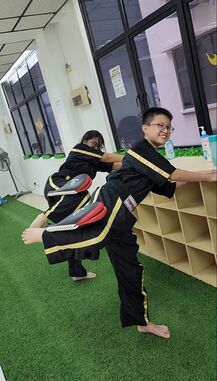|
In today's modern context, when the word "kickboxing" comes to mind, our mind naturally thinks of: boxing ring, blood, danger. However, that's not the case as another aspect of kickboxing offers belt grading, discipline and respect (think of chinese kung fu movies where practitioners practice gracefully on mountain tops).
1. Belt Grading Much like Taekwondo has a belt grading system, so does Kickboxing. Our Kickboxing belt system is recognised by WAKO and consists of 11 levels before you attain your black belt. Kickboxing is one of the few modern combat sports that offers a belt grading system, compared to Boxing, MMA or Muay Thai which does not. While each sport has its unique strengths, it's important you choose one that is aligned with your interests. A kickboxing belt system can help your child to increase adherence to the sport for a longer time, as every 4 to 8 months, they get graded for their next level. By staying committed for a longer period of time, your child is sure to improve and progress! 2. To Fight, or not to Fight? In Kickboxing, only kids aged 15 and older may start competing in the ring. From the age of 7 and up, they have the option of competing on the Tatami (think red and blue jigsaw puzzle mats like Taekwondo and Karate). While these competition avenues are available to children, it is important to note that approximately 8 out of 10 kids will NOT compete. Not competing doesn't mean you don't reap the full benefits the sport has to offer. It just means that your child will not compete, period. Your child can still continue training on a weekly basis, and still attain the prized black belt. Most kids enjoy the sport, the punching and the kicking but don't enjoy fighting, and that's ok! 3. Discipline and Respect Teaching methodology today has evolved greatly. What was once accepted 'corporal punishment' in the 1980s constitutes as 'child abuse' today. The way martial arts are taught today has evolved a great deal too. Majority of martial arts teaching focuses on discipline and respect. Respect the Coach/Master, respect the Dojo/Studio, Respect your Peers/Classmates. Discipline will be inculcated in your child as they undergo training and perform countless kicks in pursuit of perfection. Such discipline will only be taught through lived experiences. With Kickboxing, your child will not only be physically stronger, but characteristically stronger. These will be the essential soft skills which are crucial for your child's tomorrow. Where Can I Learn Kickboxing? Want to try Kickboxing, but don’t know where to go? Come and join us at Active Zone. We are a female-only gym that provides kickboxing based and gym based classes to all ladies at any fitness level. So what are you waiting for? Sign up today for some action and lots of fun! Follow us on our social media pages for more information on the classes we have.
1 Comment
Kickboxing is a holistic sport that offers reams of benefits, both physical and mental for your child! We'll explore some avenues this exciting sport can engage your child.
1. Provides Physical Activity to Lower Obesity Risk and Promote Growth In a Kickboxing training session, the kids do a variety of exercises. From agility drills to running to mini obstacle courses, each session has something exciting for them to do. Physical Activity can be defined as any form of physical movement which expends energy. Through Physical Activity, kids become more active, allowing them to develop muscles which combats risk of obesity. Research shows that exercise provides the necessary mechanical stress for growth and remodelling of the musculoskeletal system (source). Exercise can thus offer more opportunities for your child to grow healthier, bigger and stronger! 2. Build Confidence In this day and age of digital technology, children are at greater risk of being bullied, both physically and digitally. Such instances of bullying can start from as young as 7. Through Kickboxing, children will build self-confidence by overcoming challenges and watching their techniques improve. Confidence comes from feelings of well-being, acceptance of your body and mind and belief in your own ability, skills and experience (source). As kids improve on their skills and become more proficient, they gain confidence. Such confidence can be vital building blocks to their overall self-esteem, giving them greater resilience against bullying. 3. Self-Defence Can Kickboxing be used for self-defence? The answer is both yes and no. The Yes: Our Kickboxing syllabus comprises of 11 belt levels, with self-defence elements incorporated into certain levels. Such self-defence techniques can be as simple as 1 movement or a series of complex movements. These techniques were developed by our grandmaster, Brian Beck, who had years of military special forces training in the Special Air Service (SAS), combined with other various martial arts such as Aikido and Hapkido. The No: The familiar moves we see on television are not usually the best methods for self-defence. For example, punching someone in the face can cause you to fracture your hands (if you're not conditioned) because you've just punched one of the densest bones in a human body. Hence, the familiar moves that we see in kickboxing (punches and kicks) are not the most suited in self-defence situations. Overall, Kickboxing offers an opportunity for your child to get healthy, build confidence and learn simple self-defence techniques to combat bullying. With belt progression, it provides the necessary stepping stones for your child to gain confidence and stay motivated! Where Can I Learn Kickboxing? Want to try Kickboxing, but don’t know where to go? Come and join us at Active Zone. We are a female-only gym that provides kickboxing based and gym based classes to all ladies at any fitness level. So what are you waiting for? Sign up today for some action and lots of fun! Follow us on our social media pages for more information on the classes we have. You can learn a kick in 1 minute, but to perfect the kick takes much longer. Here are some ways you can improve your roundhouse kicks.
3. Train Single-Leg Balance Balancing on one leg is easy. Balancing on one leg while executing a leg technique makes it more challenging. You will need single leg stability when throwing kicks. Hence, it is paramount to work on single leg balance. In addition, such training will improve leg proprioception which will enhance your kicks. To train single leg balance, simply lift one leg to a 90-degree angle and hold it for at least 10 seconds. You may increase the difficulty of the exercise by holding a weight, standing on an unsteady surface (such as a bosu balance trainer) or even switching up your foot position (toes pointing forward, sideways and backwards). Where Can My Child Learn Kickboxing?
Want to try Kickboxing, but don’t know where to go? Come and join us at Active Zone. We run a credible kids kickboxing program with a grading system accredited by WAKO. So what are you waiting for? Sign up today for some action and lots of fun! Follow us on our social media pages for more information on the classes we have
There is evidence-based research to suggest that sports and physical activity can enhance cognitive development in several ways.
Where Can My Child Learn Kickboxing? Want to try Kickboxing, but don’t know where to go? Come and join us at Active Zone. We run a credible kids kickboxing program with a grading system accredited by WAKO. So what are you waiting for? Sign up today for some action and lots of fun! Follow us on our social media pages for more information on the classes we have.  Our kids in their classes learning through kickboxing-based games Our kids in their classes learning through kickboxing-based games Research has shown that children learn better through play. Play can come through many forms, but for today, we'll focus on play through Kickboxing. What is Play? Play essentially is allowing a child to have fun through activities. Play provides opportunities for children to explore, experiment, and problem-solve in a safe and enjoyable environment. Through play, children can develop social skills, language skills, cognitive skills, and physical skills. How Play can Benefit your Child?
For example, when children engage in imaginative play, they are able to practice communication and social interaction skills, as well as develop their creativity and problem-solving abilities. When children play with blocks or puzzles, they are developing their spatial reasoning and math skills. And when children engage in physical play, such as running, jumping, and climbing, they are developing their gross motor skills and overall physical health. Play is also an effective way for children to learn and retain new information. When children are interested and engaged in what they are learning, they are more likely to remember and apply that knowledge later on. Is there Play during our Kickboxing classes? At the end of each class, we introduce fun kickboxing-based games to reinforce the learnings they have undergone. This helps to strengthen the learning experiences for the child and enhance the absorption of the skills. Therefore, play is an important part of early childhood education, and parents and educators should encourage children to engage in a variety of play-based activities to promote their development and learning. Where Can My Child Learn Kickboxing? Want to try Kickboxing, but don’t know where to go? Come and join us at Active Zone. We run a credible kids kickboxing program with a grading system accredited by WAKO. So what are you waiting for? Sign up today for some action and lots of fun! Follow us on our social media pages for more information on the classes we have. Making friends is an essential part of a child's social and emotional development, and it plays an important role in their overall well-being. Here at Active Zone, we encourage children to build meaningful friendships which will help enhance their social skills development. Here are some reasons why it's important for kids to make friends:
Overall, having friends helps children develop important social and emotional skills, feel supported, and enjoy life. Where Can My Child Learn Kickboxing? Want to try Kickboxing, but don’t know where to go? Come and join us at Active Zone. We run a credible kids kickboxing program with a grading system accredited by WAKO. So what are you waiting for? Sign up today for some action and lots of fun! Follow us on our social media pages for more information on the classes we have. Children can start learning sports as early as 3 years old through physical activities such as running, throwing and catching a ball, playing simple games and martial arts (such as kickboxing).
There are 4 reasons why it is beneficial for kids to learn sports at an early age.
Where Can My Child Learn Kickboxing? Want to try Kickboxing, but don’t know where to go? Come and join us at Active Zone. We run a credible kids kickboxing program with a grading system accredited by WAKO. So what are you waiting for? Sign up today for some action and lots of fun! Follow us on our social media pages for more information on the classes we have. Kickboxing for your child can provide a wide range of benefits. For children, they stand to gain both physical and mental benefits. Some of the key benefits of kids kickboxing include:
Where Can My Child Learn Kickboxing?
Want to try Kickboxing, but don’t know where to go? Come and join us at Active Zone. We run a credible kids kickboxing program with a grading system accredited by WAKO. So what are you waiting for? Sign up today for some action and lots of fun! Follow us on our social media pages for more information on the classes we have. |
AuthorWrite something about yourself. No need to be fancy, just an overview. Archives
March 2024
Categories
All
|
